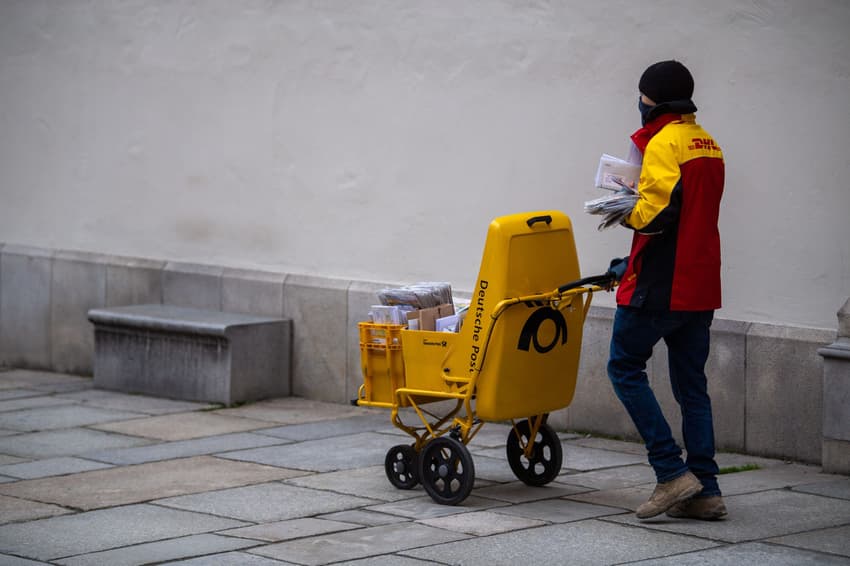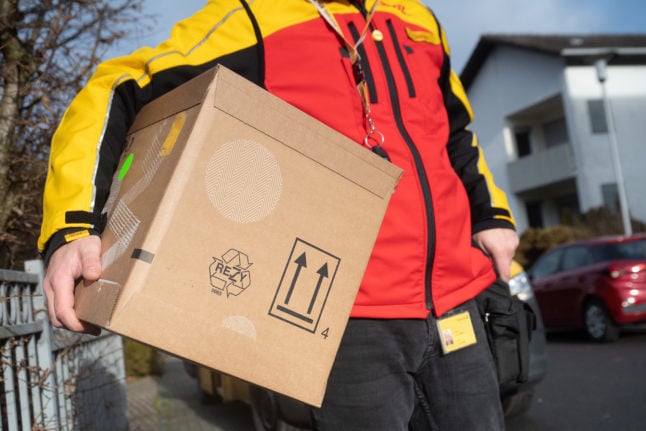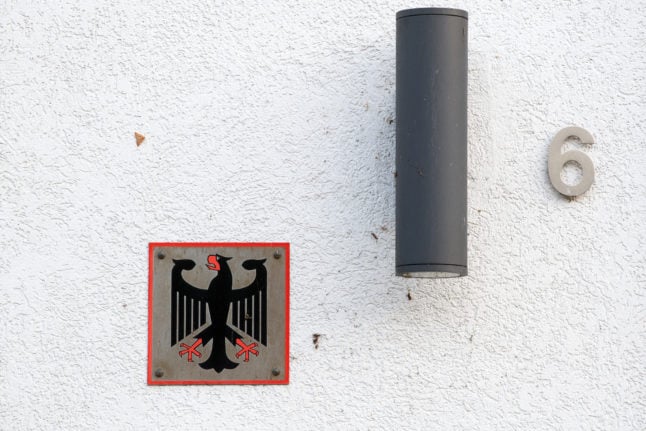How to challenge high import fees on non-EU parcels in Germany

Residents of Germany have been complaining of high charges levied on gifts sent from outside the EU - many of which should be exempt from customs fees. Here's what to do if you're facing this problem.
Receiving a parcel from someone you love can be one of life's small pleasures, whether it's a thoughtful handmade gift or something special for your birthday.
But in recent months, many residents of Germany have been furious to discover that their parcels from outside of the EU have been held by couriers and are only released upon payment of steep import charges and admin fees.
When The Local conducted a survey on this topic back in February, around 95 percent of respondents said they'd been asked to pay some sort of fee before they were allowed to collect parcels from non-ÉU countries - including gifts from family and friends.
Most commonly, people said they'd been charged for parcels coming from the UK after Brexit, though shipments from other non-EU countries such as the United States, Hong Kong and India were also subject to hefty fees.
READ ALSO: ‘Ridiculous’: Foreigners in Germany hit by high fees on non-EU parcels
Stuttgart-resident Rebecca, 24, told us she had been charged more than €10 in total to receive a box of her own belongings from the UK.
"It was a ridiculous amount,” she said. "But I knew if I tried to question it at the post office I wouldn’t understand the explanation either, so I just paid it.”
As in Rebecca's case, many people have felt they have no choice but to pay the fees, even if they believe that they've actually been incorrectly charged. Sadly, a large number of our respondents said they had simply asked family and friends abroad not to send them anything in the future.
Nevertheless, in some cases it may be worth challenging a fee that doesn't seem proportionate. Here's what to know about the fees that should (and shouldn't) be levied and how to try and claim your money back.
What fees are levied on non-EU parcels?
Firstly, it's important to distinguish between gifts (or your own personal belongings) and commercial parcels from outside the EU.
On July 1st, 2021, the previous €22 exemption limit for purchases from non-EU countries was dropped. That means that, from this date, any goods with a value of over €1 ordered from outside the EU have been subject to import VAT and, in the case of so-called luxury goods like tobacco and alcohol, excise duty.
If goods worth over €150 are ordered from a non-EU country, the recipient will also have to pay customs charges. The rules were changed to level the competitive playing field between EU and non-EU sellers, but in reality they mean that a bargain purchase from China or the US may not be such a bargain after all.
READ ALSO: EXPLAINED: Why people in Germany are being charged to receive small parcels from outside the EU
It's important to note that, according to the German authorities, 'swap' deals conducted online or purchases from sellers via online auctions also count as commercial shipments and are therefore subject to things like VAT and import charges.
Then there are gifts and non-commercial shipments, which are exempt from VAT and customs and excise charges up to a certain value. To meet this criteria, gifts must be:
- Less than €45 in total value
- Sent by an individual to an individual (rather than a business)
- Intended for personal use only
- Not paid for by the recipient
If your parcel meets all the above criteria, it should be free-of-charge to receive and not subject to any admin fees from couriers, aside from the normal postal charges.
Why are people being overcharged?
This is a very good question, and one that's hard to get to the bottom of.
One reason for it could be the scrapping of the €22 exemption limit for non-EU purchases last July. Though this shouldn't apply to gifts, it has vastly increased the number of parcels that are now subject to import VAT within the EU, which could mean that low-value gifts are being lumped in with purchases in some cases.
The other issue could be to do with the system for relaying information on the parcel. According to the German Customs Office, the postal courier in the third county (say, the UK's Royal Mail) is tasked with relaying the information on the customs form to their EU partner (say, DHL) electronically.
This information is then used by the courier in Germany to submit a declaration to the Customs Office, who then apply the relevant taxes.
In this slightly unwieldy system, there seems to be a lot of potential for human error.
A spokesperson for the Deutsche Post group seemed to confirm this view, explaining that the postal operator occasionally has a hard time verifying whether charges should be added to parcels or not.

A DHL worker carries a parcel in his arm while working in Ober-Ramstadt, Hesse. Photo: picture alliance/dpa | Sebastian Gollnow
"The calculation of the specific VAT or customs duty charge is based on a customs declaration done by Deutsche Post," they told The Local.
"The customs declaration is based on the electronic information which the sender is required to transmit with the shipment. Given the high amount of customs declarations that Deutsche Post is transmitting daily to the Customs Office, plus the fact that some shippers/countries unfortunately provide bad data quality, it is not always easy to assess the nature of the shipment."
The Customs Office spokesperson also appeared to blame the couriers and senders in non-EU countries.
"If a consignment is to be treated as a gift, it has to contain a corresponding note," they said. "If such information is missing, the postal or courier service will report the consignment to customs as a commercial import consignment.
"In addition, it can also happen that the data was not correctly or not completely taken over by the shipping company in the third country. Neither the postal or courier service in Germany nor customs has any influence on this."
READ ALSO: What you need to know about sending post between Germany and the UK after Brexit
Who should I contact if the fees are incorrect?
If you've reviewed all the above criteria and are still convinced that you've been wrongly charged for your parcel, your first portal of call is the Customs Office.
The contact details for the Customs Office can be found on their website and they have a special email address for enquiries in English. They also have some useful information in English about postal fees and regulations if you need to check anything first.
In your email, give as many details as you can about the shipment, but most crucially mention that it was a gift and that the value of the contents was less than €45.
Unfortunately, the Customs Office won't be able to refund any administrative fees you may have been charged by the German courier.

A small plaque with the German Bundesadler sits on the side of the Customs Office in North Rhine-Westphalia. Photo: picture alliance/dpa | Federico Gambarini
However, Deutsche Post tells us that they are open to reimbursing an incorrectly levied admin fee, so simply contact their customer service representatives to try and arrange your refund.
Understandably, you may feel like it's not worth kicking up a fuss over a matter of euros, and whether you choose to challenge the fees is entirely up to you. As the old saying goes: "Pick your battles."
Nevertheless, challenges to unfair fees may make a small difference in encouraging couriers to be a bit more thorough when checking and transmitting information about shipments in the future.
We can always live in hope.
Other tips for avoiding import charges
If your family or friends are planning on sending you anything from outside the EU, ask them to fill in the customs form carefully and to be sure to clearly mark it as a gift and state the value of it on the form.
You can also gently suggest that, if they'd like to order something to your house directly, it's best to do it from a German or EU-based business so that the parcel won't be subject to fees.
Many online marketplaces and retailers in Germany have English-language websites for the international crowd, so this shouldn't be too tricky for them to navigate.
Have you successfully challenged fees on parcels or have an experience of receiving non-EU gifts you'd like to tell us about? Let us know by emailing [email protected].
Comments
See Also
Receiving a parcel from someone you love can be one of life's small pleasures, whether it's a thoughtful handmade gift or something special for your birthday.
But in recent months, many residents of Germany have been furious to discover that their parcels from outside of the EU have been held by couriers and are only released upon payment of steep import charges and admin fees.
When The Local conducted a survey on this topic back in February, around 95 percent of respondents said they'd been asked to pay some sort of fee before they were allowed to collect parcels from non-ÉU countries - including gifts from family and friends.
Most commonly, people said they'd been charged for parcels coming from the UK after Brexit, though shipments from other non-EU countries such as the United States, Hong Kong and India were also subject to hefty fees.
READ ALSO: ‘Ridiculous’: Foreigners in Germany hit by high fees on non-EU parcels
Stuttgart-resident Rebecca, 24, told us she had been charged more than €10 in total to receive a box of her own belongings from the UK.
"It was a ridiculous amount,” she said. "But I knew if I tried to question it at the post office I wouldn’t understand the explanation either, so I just paid it.”
As in Rebecca's case, many people have felt they have no choice but to pay the fees, even if they believe that they've actually been incorrectly charged. Sadly, a large number of our respondents said they had simply asked family and friends abroad not to send them anything in the future.
Nevertheless, in some cases it may be worth challenging a fee that doesn't seem proportionate. Here's what to know about the fees that should (and shouldn't) be levied and how to try and claim your money back.
What fees are levied on non-EU parcels?
Firstly, it's important to distinguish between gifts (or your own personal belongings) and commercial parcels from outside the EU.
On July 1st, 2021, the previous €22 exemption limit for purchases from non-EU countries was dropped. That means that, from this date, any goods with a value of over €1 ordered from outside the EU have been subject to import VAT and, in the case of so-called luxury goods like tobacco and alcohol, excise duty.
If goods worth over €150 are ordered from a non-EU country, the recipient will also have to pay customs charges. The rules were changed to level the competitive playing field between EU and non-EU sellers, but in reality they mean that a bargain purchase from China or the US may not be such a bargain after all.
READ ALSO: EXPLAINED: Why people in Germany are being charged to receive small parcels from outside the EU
It's important to note that, according to the German authorities, 'swap' deals conducted online or purchases from sellers via online auctions also count as commercial shipments and are therefore subject to things like VAT and import charges.
Then there are gifts and non-commercial shipments, which are exempt from VAT and customs and excise charges up to a certain value. To meet this criteria, gifts must be:
- Less than €45 in total value
- Sent by an individual to an individual (rather than a business)
- Intended for personal use only
- Not paid for by the recipient
If your parcel meets all the above criteria, it should be free-of-charge to receive and not subject to any admin fees from couriers, aside from the normal postal charges.
Why are people being overcharged?
This is a very good question, and one that's hard to get to the bottom of.
One reason for it could be the scrapping of the €22 exemption limit for non-EU purchases last July. Though this shouldn't apply to gifts, it has vastly increased the number of parcels that are now subject to import VAT within the EU, which could mean that low-value gifts are being lumped in with purchases in some cases.
The other issue could be to do with the system for relaying information on the parcel. According to the German Customs Office, the postal courier in the third county (say, the UK's Royal Mail) is tasked with relaying the information on the customs form to their EU partner (say, DHL) electronically.
This information is then used by the courier in Germany to submit a declaration to the Customs Office, who then apply the relevant taxes.
In this slightly unwieldy system, there seems to be a lot of potential for human error.
A spokesperson for the Deutsche Post group seemed to confirm this view, explaining that the postal operator occasionally has a hard time verifying whether charges should be added to parcels or not.

"The calculation of the specific VAT or customs duty charge is based on a customs declaration done by Deutsche Post," they told The Local.
"The customs declaration is based on the electronic information which the sender is required to transmit with the shipment. Given the high amount of customs declarations that Deutsche Post is transmitting daily to the Customs Office, plus the fact that some shippers/countries unfortunately provide bad data quality, it is not always easy to assess the nature of the shipment."
The Customs Office spokesperson also appeared to blame the couriers and senders in non-EU countries.
"If a consignment is to be treated as a gift, it has to contain a corresponding note," they said. "If such information is missing, the postal or courier service will report the consignment to customs as a commercial import consignment.
"In addition, it can also happen that the data was not correctly or not completely taken over by the shipping company in the third country. Neither the postal or courier service in Germany nor customs has any influence on this."
READ ALSO: What you need to know about sending post between Germany and the UK after Brexit
Who should I contact if the fees are incorrect?
If you've reviewed all the above criteria and are still convinced that you've been wrongly charged for your parcel, your first portal of call is the Customs Office.
The contact details for the Customs Office can be found on their website and they have a special email address for enquiries in English. They also have some useful information in English about postal fees and regulations if you need to check anything first.
In your email, give as many details as you can about the shipment, but most crucially mention that it was a gift and that the value of the contents was less than €45.
Unfortunately, the Customs Office won't be able to refund any administrative fees you may have been charged by the German courier.

However, Deutsche Post tells us that they are open to reimbursing an incorrectly levied admin fee, so simply contact their customer service representatives to try and arrange your refund.
Understandably, you may feel like it's not worth kicking up a fuss over a matter of euros, and whether you choose to challenge the fees is entirely up to you. As the old saying goes: "Pick your battles."
Nevertheless, challenges to unfair fees may make a small difference in encouraging couriers to be a bit more thorough when checking and transmitting information about shipments in the future.
We can always live in hope.
Other tips for avoiding import charges
If your family or friends are planning on sending you anything from outside the EU, ask them to fill in the customs form carefully and to be sure to clearly mark it as a gift and state the value of it on the form.
You can also gently suggest that, if they'd like to order something to your house directly, it's best to do it from a German or EU-based business so that the parcel won't be subject to fees.
Many online marketplaces and retailers in Germany have English-language websites for the international crowd, so this shouldn't be too tricky for them to navigate.
Have you successfully challenged fees on parcels or have an experience of receiving non-EU gifts you'd like to tell us about? Let us know by emailing [email protected].
Join the conversation in our comments section below. Share your own views and experience and if you have a question or suggestion for our journalists then email us at [email protected].
Please keep comments civil, constructive and on topic – and make sure to read our terms of use before getting involved.
Please log in here to leave a comment.